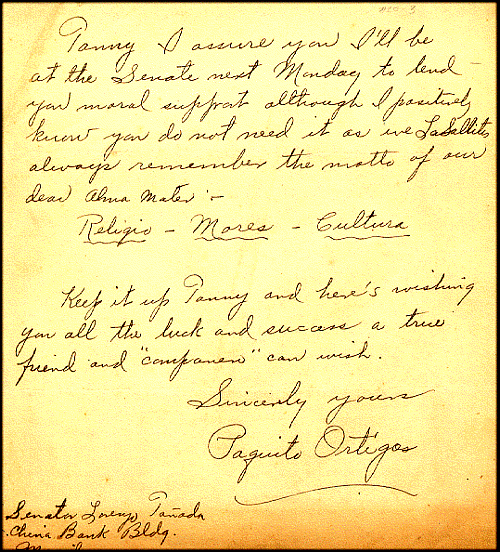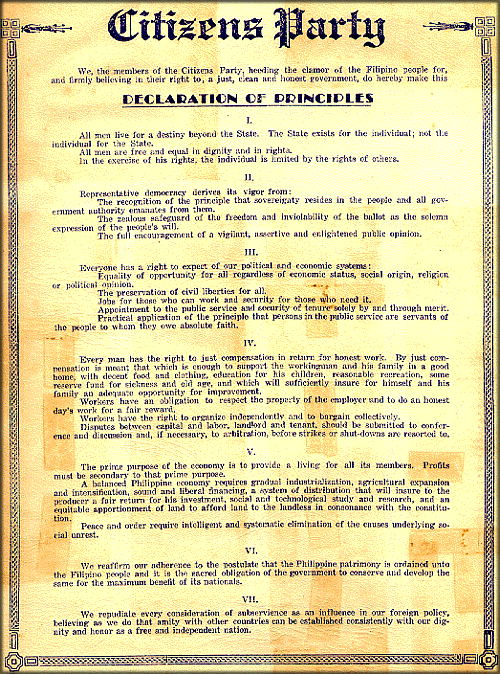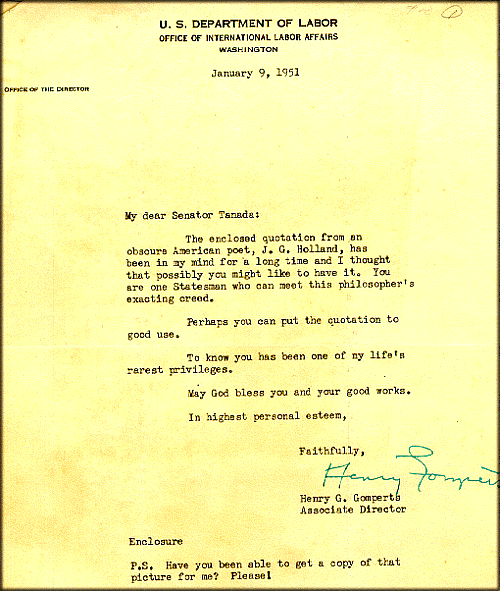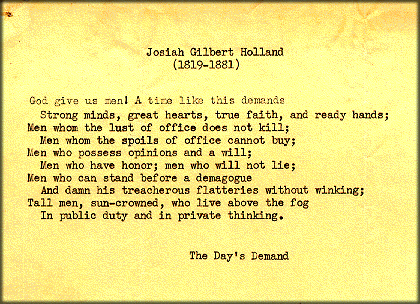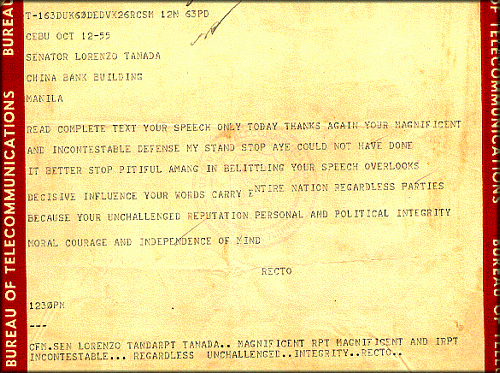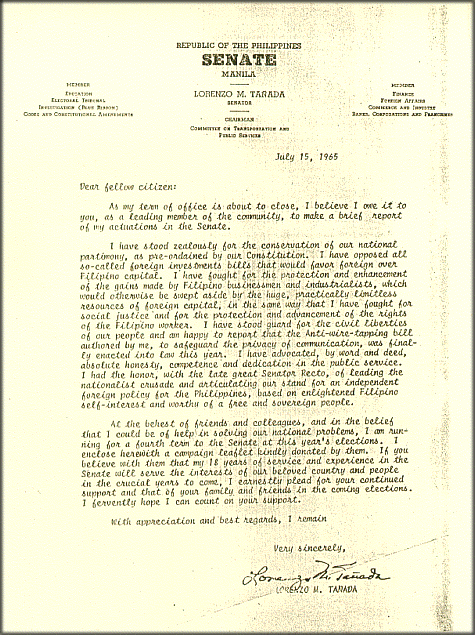Senator for 24 Years
In 1947, Tañada ran for senator under President Roxas’ Liberal Party banner and bagged first place. The Filipino people voted him back to the Philippine Senate in 1953, in 1958 and again in 1964 for a total of 24 consecutive years – the longest Senate career in Philippine history. During this period in his life, he formed the Citizens Party, moved for the suspension of Senate President Jose Avelino, exposed the scandals to which President Elpidio Quirino was linked, ran as Vice Presidential candidate of Don Claro M. Recto under the Nationalist Citizens Party and introduced 166 bills that advocated the civil liberties of every Filipino and the nationalist solution to the country’s problems.
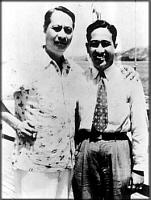
Tañada with President Manuel Roxas
In view of your nomination by the Liberal Party as a candidate for Senator in the election to be held next November, I am constrained to accept your resignation as Solicitor General effective upon the qualification of your successor.
Allow me to take this opportunity to convey to you my profound appreciation of your self-sacrificing and efficient services to the Government as Solicitor General and my hearty congratulations on your nomination as one of the official candidates for Senator of the Liberal Party. I have no doubt that you will be as great an asset to the legislative branch of the Government as you have been to the judicial and executive branches.
President Manuel Roxas in a letter to Tañada, 29 July 1947
The eclat of his career was reached when he romped away with first place in the 1947 senatorial elections. This was but a fitting honor to a man who had worked himself out of obscurity through honest and persevering means. As a senator, he has already distinguished himself as a liberal within the Liberal Party, a champion of the masses, the custodian of the people’s will, and a vigorous exponent of legal and constitutional processes. An authority in Political Law, his election to the Philippine Senate was well earned.
Encore, This Week, 19 September 1948
A National Tragedy: There are ruins that bulldozers cannot clear away but that nevertheless lie squarely in the path of any program of true reconstruction, ponderous and tenacious ruins, the ugly ruins of moral concepts and moral standards. The war sowed death and mortal injuries of whose existence we have become aware only because now their stench and stink shock our civic conscience.
How much have we given those whom the war debauched in mind and soul? Who has ever sponsored or contributed to benefits for the relief and rehabilitation of those whose consciences were widowed of charity and orphaned of principle in the moral battles of the Occupation? Yet as I look upon our country today, I cannot escape the conviction that the true tragedy of the Filipino people has been not the loss of our material possessions, our buildings, our churches, our sugar-mills and rice-mills, our plantations, our bridges and homes, but the death-march of so many of our cherished traditions and standards in so many of our men and women. I find the sad spectacle of public servants unashamedly living beyond their visible means, more disturbing than the most pitiful wreck by the wayside. I find the hand extended to receive a bribe more shocking than the mangled limb of a veteran turned beggar. For there is always hope of material reconstruction; there is always a remedy for physical sickness; but moral disease, moral ruin, if not immediately attended to, can be irreparable and incurable sometimes.
Tañada, as quoted in Encore, This Week, 19 September 1948
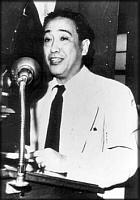
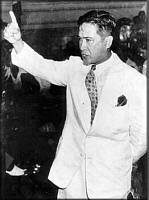
In both public and private life, Senator Lorenzo M. Tañada is a modest, not an aggressive man. His sincerity in fighting for the rights of the down-trodden is almost religious and his sense of responsibility towards the people who elected him, tremendous. So tremendous that he would, by the exercise of his sound and mature judgment on national questions, even go against the heads of the political party of which he is member. “My loyalty to my party is only incident to my loyalty to my country,” the Senator declared.
The Quezonian, 15 September 1948
Tanny I assure you I’ll be at the Senate next Monday to lend you moral support although I positively know you do not need it as we La Sallites always remember the motto of our dear Alma Mater — Religio - Mores - Cultura
Don Francisco Ortigas in a letter to Tañada, undated
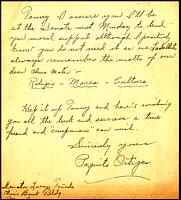
Letter from Ortigas
Don Francisco Ortigas in a letter to Tañada, undated
It became apparent that the progress of the formation of the Citizens Party would be slow and difficult unless a leader of national prominence, embodying in his character and political record the principles of the Party, was chosen to lead it. The answer to this problem came almost immediately when Senator Lorenzo M. Tañada bolted the Liberal Party on 9 June 1949. Senator Tañada’s unimpeachable and incomparable honesty, his immaculate public record and his brilliant work as a fighting Solicitor General made him the only choice for leadership in the new party.
Raul Manglapus, Citizens Party, Philippine Herald
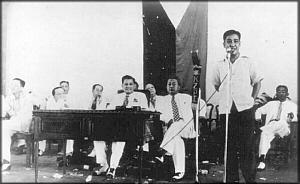
Tañada at the National Convention of the Liberal Party, University of Sto. Tomas, 26 July 1947. He bolted from the party in 1949.
Senator Lorenzo M. Tañada formally launched the Citizens Party yesterday, declaring that “there is room for a new party when none exists to which a true and faithful citizen of this republic can, without losing his self-respect, give his unqualified allegiance and support” and “when the old are equally discredited, equally impotent, equally bankrupt in the resources of faith, honor and principle which alone can sustain the confidence of our people”.
Manila Chronicle, 3 September 1949
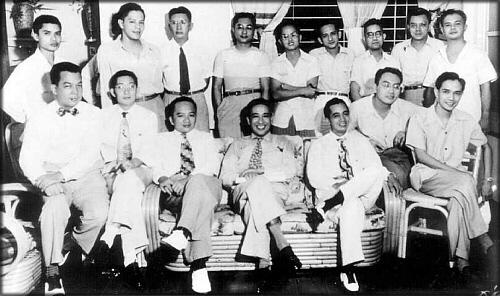
Tañada with other members of the Citizens Party, 1949
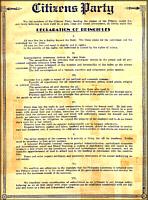
Citizens Party Declaration
Citizens Party Declaration
Answering criticisms that there is no room for the Citizens Party, composed of young professionals and businessmen, Tañada said, “In the midst of folly and knavery, there is always room for justice and in the prevalence of incompetence, corruption, hypocrisy and naked greed, there is always reason for the firm and sincere pursuit of honesty, efficiency, self-sacrifice, and the supremacy of the people and the nation over the interests of party, person, and class”.
Manila Chronicle, 3 September 1949
As Quirino listened to every word that flowed in quick succession from Tañada’s lips, he began to show discomfort. Now he would cup his chin in his hand, then lie back in his chair. Or, he would drink water from his glass while the senator from Quezon province kept hitting at him with sledge hammer blows.
The two and a half hours that President Quirino spent listening to Tañada and Laurel must have been the most irksome hours he ever experienced in his entire political life. Stung by the insinuation that the Buenavista-Tambobong Estates deal was a “family affair”, President Quirino turned to the Citizens Party head who was seated on his right and in a voice quivering with indignation said: “You can have my life if you find anything to prove that I personally profited from the Tambobong deal or any other deal.” Tañada rose and shouted: “I accept! I accept!”.
Philippine Free Press, 26 August 1950
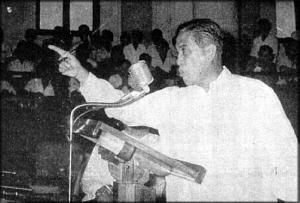
Tañada emphasizing a point during a privilege speech on the Senate floor
Here indeed is the bitterest irony of history, that a Rizal should have perished, that a generation of youth shall have fallen on the fields of battle, in order that small and greedy men could do business and enrich themselves in public office. But I have faith, and we all have faith that our republic deserves a better destiny than lying prostrate with immigration quota, surplus deals and all imaginable forms of scandals.
Tañada, Manila Chronicle, 3 September 1949
The enclosed quotation from an obscure American poet, J. G. Holland, has been in my mind for a long time and I thought that possibly you might like to have it. You are one statesman that can meet this philosopher’s exacting creed.
To know you has been one of my life’s rarest privileges.
Henry G. Gomperts, Associate Director, U.S. Department of Labor, in a letter to Tañada, 9 January 1951
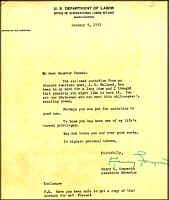
The poem “This Day’s Demand”, became one of Tañada's favorites. He taught it to his children & grandchildren.
The poem “This Day’s Demand”, became one of Tañada's favorites. He taught it to his children & grandchildren.
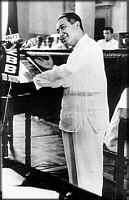
Sen. Lorenzo Tañada debates on the Senate floor against the junket trips of public officials.
Manila Bulletin, 23 April 1955
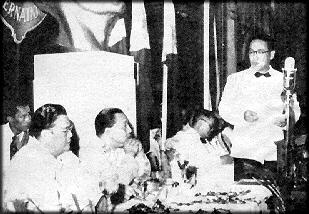
Verbal swordplay between President Quirino, Sen. Tañada and ex-President Jose P. Laurel during a Lion’s Club celebration at the Manila Hotel
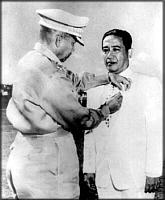
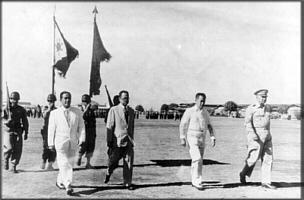
The Armed Forces of the Philippines acknowledged the wartime efforts of Tañada and Jose B. L. Reyes by awarding them with the prestigious Legion of Honor medals in 1951
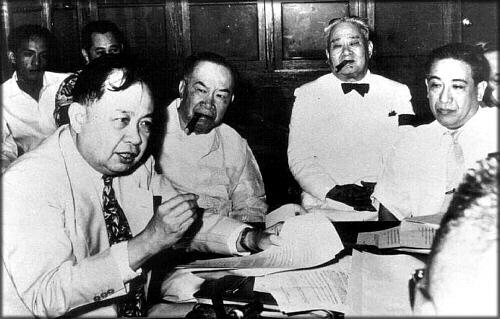
Tañada at the Senate with Senators Claro M. Recto, Jose P. Laurel, and Eulogio Rodriguez
We believe in the Ten Commandments. We believe in the Constitution. We believe in social justice. But when millions of pesos worth of surplus are delivered to our government to help in the rehabilitation of our country, who does the stealing and the plundering?
You will say business is like that. But business does not have to be like that, and politics does not have to be what it is. If we believe in the principles that we have been taught, we cannot even in conscience defend political knavery and business fraud.
Tañada, Liwayway, 4 April 1960
Your words carry entire nation regardless parties because your unchallenged reputation personal and political integrity moral courage and independence of mind
Claro M. Recto wrote in a telegram to Tañada, 12 October 1955, from Cebu
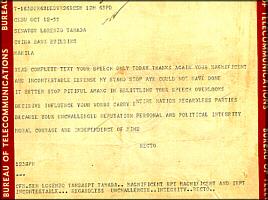
Telegram from Recto
Telegram from Recto
Any write up about Tañada would be incomplete without a footnote on his close relationship with Recto. “He opened my eyes to nationalism as a means to solve our ills… He said ‘What you are doing, going after graft and corruption is spectacular, but it is a negative attack. What the country needs is a positive approach through nationalism… Inculcate in the people new values, impel them to bring the common good over the private and personal good. Make them put the national interest over the interest of class or party. Get them to sacrifice themselves so that the country may live and prosper.’”
Amadis Ma. Guerrero, Taps for An Elder Statesman, Graphic, 5 January 1972
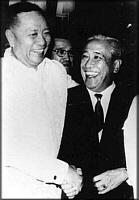
Tañada and Fernando Lopez
Now there’s a man with a clean slate, both in private and public life… About his record in the government there can only be praise. His steadfast honesty and courage are with him in his every fight. In an admirable way, together with Claro Recto, he is reviving nationalism in our countrymen. I am not waxing eloquent, but I want my sons to grow up to be true Filipinos, proud of their heritage, jealous of their sacred rights. This wave of nationalism comes at a ripe time, when our mentality is colonial, and our resources are in greedy and careless foreign hands. What, tell me, will be left for our children if we let things ride as they are? Presidents have been known to die, inevitably, in office, or after it. May this never happen while Recto graces Malacañang with his intellect and astuteness. Nevertheless, as a precautionary measure—so that the people might not be left shocked and afraid as they were when Quezon and Roxas and Magsaysay died—should they not have a vice-president who will be capable of sitting in the presidential chair and filling it just as satisfactorily?
Look to Tañada’s character: a courageous man, equipped with a mind that, sadly enough, only a few possess; fighter of graft and corruption; an outstanding senator these many years; deeply loyal to the service of his country. Tañada knows his politics, his economics, his principles. He is not the man to be tampered with. What better security can a people have than knowing that such a man is there, ready and able to serve, if need be as president.
Cecilia Reyes, in a letter supporting the Recto-Tañada ticket addressed to Carlos Moran Sison, Philippines Herald, 4 November 1957
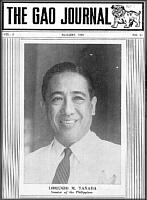
Every member of the Senate has a pet measure of his own. To this, he will devote much of his time and energy, in study and evaluation of its merits. And when the time comes for floor discussions, he is adequately prepared to defend it against one and all. His sole aim is to push the measure through approval. Very seldom does he take more than moderate interest in a measure he has not sponsored or co-sponsored for obvious reasons, one which is that the effort may not after all redound to his credit.
There is one exception, however. He is Senator Lorenzo M. Tañada.
The Gao Journal. August 1959
One view is that the cause of the evil of graft and corruption in government is not political but socio-economic. Senator Lorenzo M. Tañada, for instance, believes that graft and corruption is the consequence of lack of nationalism. Tañada describes graft and corruption as “institutional diseases brought about by the colonial past and the continuing aspects of the country’s life today.”
Tañada adds that the existence of graft and corruption “is rooted in alien dominance of our entire national life, and from this alien hegemony, Rizal and other leaders of the nationalist revolution of 1896 had sought to liberate us”.
Manila Chronicle, 5 November 1959
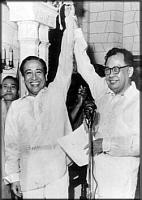
Tañada and Recto
Sen. Lorenzo Tañada, flashing the form that carried him through the arduous 1959 campaign, captured the University of the Philippines College of Law walkathon contest Saturday. The walkathon, a 10-kilometer grind from the España rotonda to the UP administration building in Diliman, is participated in by an impressive array of UP law alumni in connection with the UP College of Law Golden Jubilee Celebration. Tañada covered the distance in one hour and 33 minutes. Coming in three minutes later was Senator Arturo Tolentino. Ex-Judge Antonio Quirino finished third.
Kislap Graphic, 14 January 1961
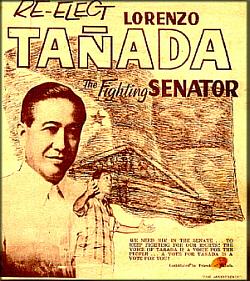
Free Press, 31 October 1959
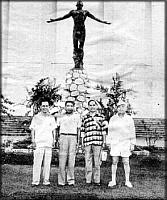
(L-R) Antonio Quirino, Tañada, Arturo Tolentino and Jorge Vargas
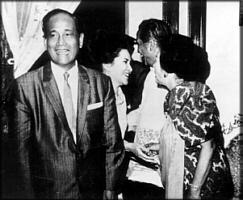
Tañada and wife, Expedita, in a social gathering with President Carlos Garcia and wife, Inday
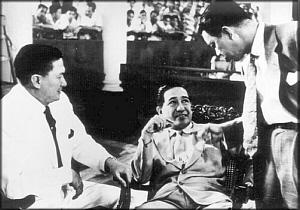
Tañada discussing matters of national interest with Senators Emmanuel Pelaez and Gil Puyat.
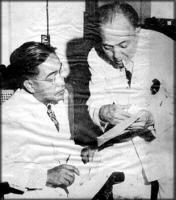
Tañada and Tirona discussing a pending Senate matter.
Free enterprise would mean the abandonment of the whole program of “Filipino First”—and this is precisely one reason why foreign economic interests here are all crying for it. Without continued government support and active intervention in behalf of Filipino industry, foreign interests could easily destroy and gobble it up.
Free enterprise too would mean the end of our dreams of establishing the basic requirements of industry here…. This would leave the field open for foreign financiers and entrepreneurs—and eventually the only role left for Filipino capitalists and industrialists would be as junior—very junior—partners in the so-called ‘joint ventures’.
Tañada, Sunday Chronicle Magazine, 30 April 1961
The present alien-owned banks except in hereditary succession, can sell or transfer their shares of stocks only to Filipinos. Actually, this is the same bill on which Congress withheld action during its last regular session because of its controversial nature. Tañada reintroduced it because, he explained, Filipinos should have control of the banking institutions because “they are the life-blood of our economy”.
Manila Times, 6 February 1962
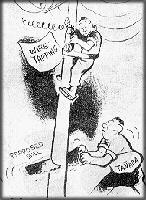
Now thanks to a bill filed in the Senate by Lorenzo M. Tañada, eavesdropping—especially the electronic type—will be punishable with a jail term from six months to four years unless the eavesdropper can show a court order or a permission from the office of the Solicitor General… No one who believes that “the acid test of successful democratic government is the degree of effective liberty it makes available to the individual” can have anything but praise for the latest Tañada bill.
Carmen Guerrero Nakpil, Chronicle, 12 January 1962
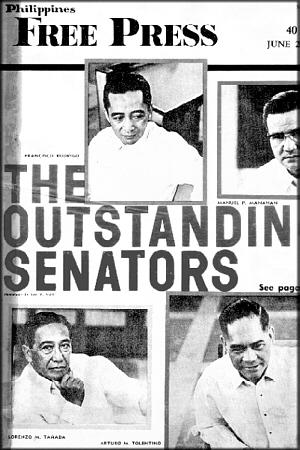
Tañada was consistently voted as one of the Most Outstanding Senators by the Philippine Free Press.
Tañada probably presented the biggest number of bills in the Senate. Among them were acts: Prohibiting and penalizing wiretapping; limiting to Filipinos shares of stock in banking institutions (existing rights respected); penalizing hoarding or manipulation of supplies of essential commodities; increasing the compensation of justices of the Supreme Court ; restricting and regulating advertising devices adjacent to national highways; providing for acquisition of Filipino citizenship by naturalization, repealing old laws; amending the Banking Act respecting receipt of deposits; amending the Civil Code respecting liability of motor vehicle owners; providing for compulsory vehicle liability insurance; amending the Administrative Code regarding suspension or removal of elective provincial officials by the president; safeguarding the independence of the judiciary.
Philippines Free Press, 2 June 1962
Although the land reform bill is littered with imperfections and provisions of doubtful constitutionality, Senators Tañada and Tolentino, leading critics of the original bill, let it pass “to give the bold, ambitious, and arbitrary scheme of Mr. Macapagal a good try.”
Senator Tañada compiled cloth-bound copies of the seven evolutionary stages of the bill “to provide my children reference material when history records the dismal failure of this ill-conceived scheme of the New Era”.
Gene De Garcia, 24 July 1963
Dear Fellow Citizen,
As my term in office is about to close, I owe it to you, as a leading member of the community, to make a brief report of my actuations in the Senate.
Tañada, accounting his accomplishments in the Senate and petitioning for support for his fourth term, 15 July 1965
If we would make meaningful individuals out of the youth who are entrusted to us, it is incumbent in us to gear education ultimately to the service of the country. This can mean only one thing in the Philippines—to be worthy and worthwhile, education must be nationalist-oriented. We are here to turn out not just competent lawyers, imaginative businessmen, skillful doctors and nurses but FILIPINO ones, professionals who are acutely conscious of their duties to their country and people.
Tañada, addressing the Manuel L.Quezon graduating class, Manila Times, 13 May 1967
The nose that started sniffing belongs to MAN—Movement for the Advancement of Nationalism—of which Senator Tañada is the chairman. Apparently, the MAN committee on economic affairs had been dissecting the Virata-Braderman report and it concluded that Paragraph 26 of the report was a commitment to grant “national treatment” to Americans after 1974. Giving a foreigner “national treatment” means giving him the same advantages as a native citizen and violates the more standard “most-favored nation” policy according to which a host nation must give equal treatment to all foreign nationals.
Quijano de Manila, Philippines Free Press, 25 May 1968
Arturo Tolentino on Tañada in the Senate
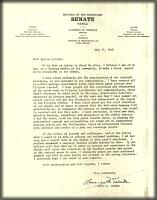
Senate Petition
Tañada Senate Petition
If we look at contracts like mature men, without being fooled by those fairy tales they tell us, we will see that there is a patent violation of the law. This is the price we pay for foreign investments—our dignity… Indeed, man does not live on bread alone.
Tañada, on the establishment of Dole Philippines, Inc., Graphic, 23 April 1969
Tañada on the Macapagal - Dole agreement
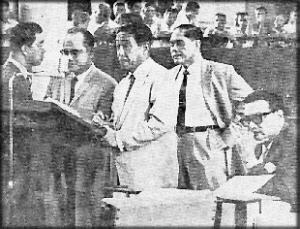
Senate stalwarts are caught stalled in deep thought during a discussion of President Macapagal’s land reform bill. (L-R): Senators Gil J. Puyat, Estanislao Fernandez, Lorenzo Tañada, Arturo Tolentino and Manuel Manahan.
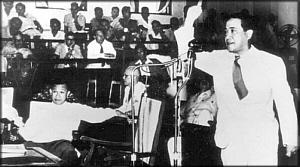
Tañada delivering one of his famous privilege speeches on the Senate floor.
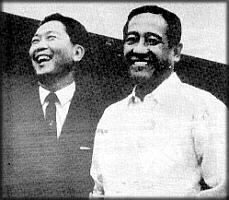
Tañada and Ferdinand E. Marcos were once colleagues at the Senate
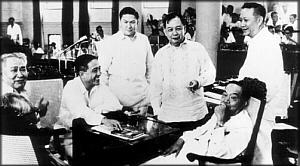
On the Senate floor during a break (L-R): Senators Eulogio Rodriguez, Tañada, Emmanuel Pelaez, Claro M. Recto, Fernando Lopez and Jose P. Laurel.
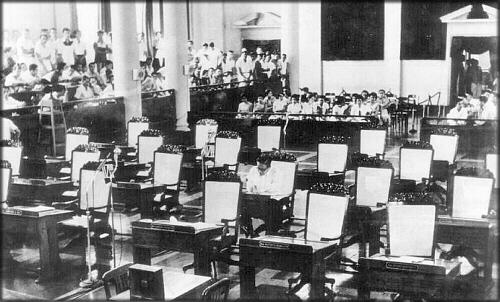
The ever-punctual man that he was, Tañada was usually the earliest senator to arrive for work on the Senate floor.
It is not true that you are a political “loner” because the people have been with you in all your crusades and have supported you with their overwhelming vote in all elections in which you sought popular sanction. You may have been alone in upholding your convictions but behind you were concerned citizens who believe in you, in your impeccable integrity, in your patriotism.
Carlos P. Romulo, Secretary of Foreign Affairs, 2 February 1972
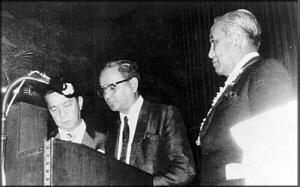
Tañada receives the Citation of his Distinguished Service as Senator for 4 consecutive terms. Reading the Citation is Mr. Eliseo Tenza, Secretary of the Senate while Senate President Gil Puyat looks on.
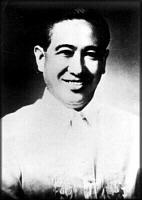
In his time as a senator, he stood out as a member of a rare tribe of men that placed country above self, duty above ambition… During his 24-year term in the Senate, Tañada stood out among giants, and proved himself a winner among champions.
Melchor Aquino, Manila Bulletin, 29 May 1992
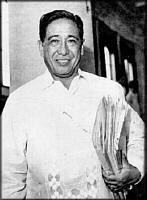
Tañada was Chairman of the Senate Blue Ribbon Committee from 1951-55
Without meaning to prick the conscience of the political overstayers, former Sen. Tañada bid his fellows goodbye in this manner:
“I have decided to retire because I feel that I have stayed long enough on the scene. Twenty four years in the Senate was more than enough for me to have done what was in my power to do for the people as a senator. There is surely some deserving young or younger man waiting in the wings for his turn. I have had mine, It is time to go.”
If the memory of Tañada’s sojourn in the Senate will linger, this is because of his unselfishness, a virtue many politicians have never heard of.
Vicente M. Tanedo, The Daily Mirror, 4 February 1972
In the Senate, Tañada distinguished himself as a fearless, hard-hitting and uncompromising fighter for civil liberties, labor rights, clean and honest government and the protection of the national patrimony and sovereignty. He was consistently chosen as one of the “Most Outstanding Senators” by the Senate Press Club and the Philippine Free Press. At the end of his term in 1971, at age 73, he opted to retire from public service. Nine months later, on 21 September 1972, President Ferdinand Marcos declared Martial Law.
